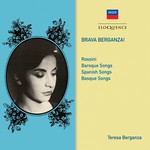
Brava Berganza! - Rossini: Arias / Canciones Espanolas: Spanish Songs & more
 $28.00
Low Stock
add to cart
$28.00
Low Stock
add to cart
ROSSINI / SCARLATTI / TURINA / GRANADOS / FALLA / GUERRERO / etc
Brava Berganza! - Rossini: Arias / Canciones Espanolas: Spanish Songs & more
Teresa Berganza (soprano) Félix Lavilla (piano) London Symphony Orchestra, Sir Alexander Gibson, Benito Lauret, Gerardo Gombau
[ Australian Decca Eloquence / 2 CD ]
Release Date: Sunday 1 April 2018
Should this item be out of stock at the time of your order, we would expect to be able to supply it to you within 2 - 4 weeks.
A newly remastered collection of four original Decca albums featuring the Spanish mezzo-soprano at the height of her powers in the repertoire most associated with her, from Rossini to folk and popular songs from her native Spain. Born in 1935, Teresa Berganza was in her mid-twenties when she made the recordings on this album, yet she was already the darling of the opera press by June 1959, when Decca first issued the wide-ranging recital of Rossini arias which opens this anthology, moving with assured mastery from the flirtatious Isabella in L'italiana in Algeri to the grave beauty of 'Fac ut portem' from the Stabat mater. Later the same year she recorded a sequence of eight Basque songs with orchestra which captivatingly exploits the dark, sultry shadings within her mezzo. Although the Rossini LP has been issued piecemeal on CD, this is the first time the entire recital appears in its entirety.
A year later, Berganza was established as an artist of singular gifts who would lend distinction to the extraordinary 'gala sequence' inserted in the second act of the label's new Viennese recording of Die Fledermaus, capable of standing her own alongside the likes of Björling, Nilsson, Sutherland and Tebaldi. Her contribution to that album was a Lullaby by her husband Félix Lavilla, which they recorded together not in Vienna but Kingsway Hall, London.
As her long-standing accompanist, Lavilla partnered Berganza in a 1962 recital of Spanish song that captures the mezzo-soprano on vibrant form, bringing her flaring tone, dramatic energy and captivating charisma to Baroque arias by Pergolesi and Scarlatti as well as songs by Granados and Turina, finishing with a classic account of Falla's Siete canciones populares españolas from 1959. As Richard Wigmore remarks in his new booklet appreciation, not even the legendary Conchita Supervia gave a more thrilling, spine-tingling performance of the cycle's concluding 'Polo'.
'She is equally at home in the fiendish Cenerentola finale (the best I've ever heard) and in the long sweeping line of 'Fac ut portem'… I can see no obstacle to a long and brilliant career for this singer. The accompaniments are clear and firm, and Decca's stereo sound is bright and full. I recommend this record without hesitation.' High Fidelity, April 1960 (Rossini)
'In the Basque songs she immediately identifies herself with each mood from tenderness to humour… I called her performance of [the Falla songs] incomparable, and it still remains so, with her completely idiomatic interpretation, vitality, exemplary enunciation, beautifully clean melismata, and wide range of colour… If for any reason you didn't have a copy before, make good the omission straight away.' Gramophone, October 1972
Tracks:
Rossini: Una voce poco fa (from Il barbiere di Siviglia)
Rossini: Contro un cor (from Il barbiere di Siviglia)
Rossini: Cruda sorte! Amor tiranno! (from L'Italiana in Algeri)
Rossini: Per lui che adoro from L'Italiana in Algeri
Rossini: Amici, in ogni evento m'affido a voi…Pensa alla patria (from L'Italiana in Algeri)
Rossini: Stabat Mater: Fac ut portem Christi mortem
Rossini: Bel raggio lusinghier (from Semiramide)
Rossini: Nacqui all'affanno, al pianto...Non più mesta (from La Cenerentola)
Guerrero, J: Sagrario's Romanza (from La Rosa del Azafrán)
Marqués, M: Margarita's Romanza (from El Anillo de Hierro)
Donostia: Basque Songs (8)
Valverde, Joaquín: Clavelitos
Chapí: Carceleras from Las hijas de Zebedeo
Cherubini: Ahi! Che forse ai miei di (from Démophoon)
Cesti: Intorno all'idol mio
Pergolesi: Confusa, smarrita
Scarlatti, A: Se delitto e l'adorarti
Scarlatti, A: Chi vuole innamorarsi (from Il Flavio)
Scarlatti, A: La Rosaura
and much much more